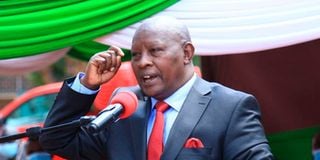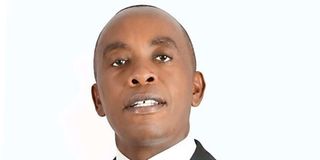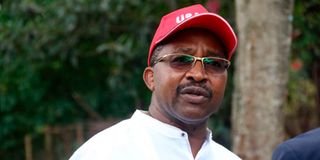Premium
Politicians rush to change names projecting known identities

Nyeri Governor Mutahi Kahiga who has officially changed his name from Edward Mutahi Kahiga to “Mwalimu Edward Mutahi Kahiga”.
The Government Printer is witnessing heightened activity ahead of the August 9 General Election as politicians change names to project their better-known identities.
This is happening even as ordinary Kenyans continue with the trend of changing their official names to “more interesting” ones.
Several aspirants appear in recent issues of the Kenya Gazette, which is published by the Government Printer.
In Saturday’s issue, the incumbent Nyeri governor who wants to retain his seat, officially changed his name from Edward Mutahi Kahiga to “Mwalimu Edward Mutahi Kahiga”.
Ms Wangui Ng’ang’a, who is aspiring to be the Nairobi Woman Representative, featured in last Friday’s issue of the publication.
She is now known as “B. Ng’ang’a Wangui and not Benadict Wangui Ng’ang’a.
In the February 18 edition, Mr Hillary Kiprotich Sigei – who is eyeing the Bomet Senate seat – changed his name to “Wakili Hillary Kiprotich Sigei”.
In the same issue, Mr Augustine Kamande Kamau, a hopeful for the Roysambu constituency seat in Nairobi changed his name to “Augustine Kamande Mwafrika”.

Kiambu Senator Kimani Wamatangi. His real identity is Paul Kimani Njoroge.
And on February 4, Mr Crispus Gachara Kamanga who wants to unseat Mr Kahiga as Nyeri governor, officially changed his name to “Anko G. Gachara wa Kamanga”.
On January 28, Mr Peter Ng’ang’a Maina changed his name to “Maina Ng’ang’a wa Safari”. He wants to be a ward representative in Kirinyaga County.
Recognition by voters
As explained last year by Mr Christopher Wanjohi Githinji an aspiring ward representative in Nairobi who is now known as “Hon Chris Mtumishi”, a name change helps voters recognise the more known identity on the ballot and is more sellable on campaign posters.
Nicknames are a common addition to names. For instance a livestock trader who appeared in last Friday’s issue had changed his name from James Kiarie Muigai to “James Kiarie Muigai Cattleman”.
In Saturday’s issue of the Kenya Gazette, Mr Alex Ngugi Kiratu changed his name to “Alex Ngugi Kiratu Atycoon”.
Some people have in the past changed their names to include titles like “Professor” and “Honourable”.
Nicknames that politicians have officially added to their names include (Mike Mbuvi) Sonko, (Kimani) Wamatangi, (Ferdinand Waititu) Babayao, and (Mwangi) Wa Iria.

Former Kiambu governor Ferdinand Waititu who officially added Babayao to his name.
In April last year, Mr Julius Owino – one of the artistes behind the “Unbwogable” song that was a hit early this century, added his stage name “Majimaji” to his official name.
He is contesting an elective seat, with the new name expected to feature on ballot papers in August.
Changing names in Kenya is surprisingly easy, as lawyers explained to the Nation.
As long as one can pay the legal and statutory fees for the procedure, which is in the region of Sh6,000, they are good to go.
According to Mr Thomas Mbaria Kuria, a lawyer who processed Mr Chris Mtumishi’s name change last year, one needs to give reasons for the in their application to the Registrar-General.
Some names may be rejected but nothing is entirely out of bounds, the lawyer said.
“You have to explain through your documentation,” he said.
Name change procedure
Mr Morara Omoke, another lawyer, explained the name change procedure.
“Your lawyer draws up a deed poll, pays the applicable stamp duty and lodges it at the Central Land Registry in Nairobi,” Mr Omoke said.
“Upon registration, they prepare the notice for publication by the Kenya Gazette to inform the public of the action taken.”

Murang'a Governor Mwangi Wa Iria. His real name is Francis Mwangi.
A birth certificate is required in the name change documents, alongside a declaration by a person who knows the applicant.
Often, a person adds or removes a name and remains with the rest.
In a few instances, however, a person changes their name to an entirely new one.
Lawyers say that is the reason a name change gazette notice usually contains all the previous names and aliases associated with the person in case some tracking is needed for matters like criminal liability.





